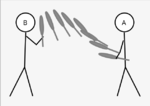User:Karsten/Redesign: Difference between revisions
No edit summary |
No edit summary |
||
| Line 20: | Line 20: | ||
* [[ First Tricks with 3 balls]] |
* [[ First Tricks with 3 balls]] |
||
--> |
--> |
||
== Entry Patterns == |
|||
These patterns are suitable for beginners. It helps a lot if one juggler is experienced. |
|||
== Beginning Zaps // Candlestick throws == |
|||
| ⚫ | |||
| ⚫ | |||
It is not necessary to be able to juggle 3 clubs alone. If thrown as described, they are easier for people not experienced with clubs than passes. |
|||
| ⚫ | |||
| ⚫ | |||
* [[ zap zap zip ]] |
|||
* [[ 5-club 1-count with zaps ]] |
|||
* [[zap-zip-flip-zap-flip - 55244 ]] |
|||
* [[5525524]] |
|||
| ⚫ | |||
Passes are probably easier than selfs for several reasons. |
|||
Teaching people passing clubs: |
|||
For the pattern labeled as "assymetric", one of passer is supposed to be far more advanced than the other, who needs no previous experience. |
|||
| ⚫ | |||
[[image:throwing-a-pass.png|thumb|upright=0.5]] |
[[image:throwing-a-pass.png|thumb|upright=0.5]] |
||
It is not necessary to be able to juggle 3 clubs alone (for the "beginner" side of the patterns when assymetric) |
|||
* [[ Throwing the first normal passes ]] |
|||
* [[ Assymetric n-count vs 1-count ]] |
|||
* [[ 5-club 1-count ]] |
|||
* [[ 720 - zip-pass ]] |
|||
Next steps: "Selfless Passing" or "Selfs and Passes" |
|||
== Beginning Selfs - Juggling 3 Clubs == |
|||
* [[Beginning Selfs - Juggling 3 Clubs]] |
* [[Beginning Selfs - Juggling 3 Clubs]] |
||
Revision as of 09:26, 10 June 2022
The goal of this wiki is to offer "learning paths", of similar patterns with increasing difficulty.
There are different types of difficulty, so there is more than one starting point for each type of throw. Entry points with no/little experience all start with "Beginning with"
The beginnings (mostly) use only one throw type. When that throw has been practiced in different patterns, we start mixing different throw types.
Entry Patterns
These patterns are suitable for beginners. It helps a lot if one juggler is experienced.
"Selfless Passing" (Zips and Passes)
- inverted parsnip - 4 clubs - PZZPZ
- parsnip - 5 clubs - PPZPZ
- The ugly brother of parsnip - 77272 - 5 clubs - PPPZZ
- PPPPZ - 6 clubs
- 7-club 1-count
Training Patterns Selfs and any kind of pass (zap, single pass, double pass)
Zaps and Selfs
5-club 2-counts with zaps (dead bunny and killer bunny)
Asyncronous patterns resembling n-count for each juggler. One throws passes, the other throws zaps. They are not very nice patterns, hence the name:
This is a good "real" start into patterns with zaps and selfs, because the zip-self can just be substituted with doing nothing.
The next patterns already mix high selfs and low zaps:
Single Passes and Selfs
6 club Half-Synchronous patterns (right hand of both jugglers throws at the same time), a.k.a "normal passing":
- 6-club 4-count
- 6-club 3-count
- 6-club 2-count
- 6-club 1-count
- 6-club PPS - Pass Pass Self
- 6-club Chocolate bar - PPSS
- 6-club Vanilla bar - PSSP
"Jim's" version of those patterns:
- 6-club Jim's 4-count
- 6-club Jim's 3-count
- 6-club Jim's 2-count - 77466
- 6-club Jim's 1-count
- 6-club Jim's PPS
Double Passes
- early double - in 4-count, 3-count, 2-count, etc?
- late double - in 4-count, 3-count, 2-count
- Throwing the first double passes - self-pass
- pass-self vs dpass-zip 7962
- doublepass-zip <4p|1><1|4p>
- dpass self zip self zip - 96622
- PZPZPZZ (doubles) - 9229922
Heffs in Solo Patterns - 4 club exercises
Recommended solo-patterns before you start:
- solo 423
- solo 40 - two clubs in one hand with doubles
- solo 441
- solo 4 clubs with doubles
Heffs in Passing Patterns
Tricks, typically done in 4-count, 3-count, etc.
First patterns with a heff - 5 club why nots
The why not family - 6 clubs:
7 club why nots:
Double Selfs in Solo Patterns // Learning the 5 Ball Cascade
The "normal" 5 club cascade is juggled with double selfs. Usually long before that you learn to juggle 5 balls.
The patterns for practicing double selfs and for preparing you for each 5-object pattern are mostly the same.
Triple Selfs in Solo Patterns
Popcorns (Heffs or Triple selfs)
Doubles vs Passes
- Dpass,Self vs. Pass,Zip - 7926
- DP DP Z DP ZZ vs. P Z Z P P Z - 979222972722
- DP DP DP DP DP DP Z vs. P P Z P P P
Here Be Dragons - The Quest for the Holy Grail
A dragon is a double pass followed by a zap. They both arrive at the same hand, the zap first.
- 92522
- baby dragon 756
- dragon - black beast of aaaarg - 945
- dragon cat - 95524
- 97522
- Holy Grail - 975

